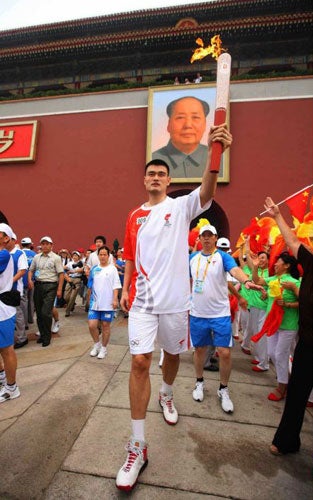Let the diplomatic Games begin... but which leaders are taking part?

Your support helps us to tell the story
From reproductive rights to climate change to Big Tech, The Independent is on the ground when the story is developing. Whether it's investigating the financials of Elon Musk's pro-Trump PAC or producing our latest documentary, 'The A Word', which shines a light on the American women fighting for reproductive rights, we know how important it is to parse out the facts from the messaging.
At such a critical moment in US history, we need reporters on the ground. Your donation allows us to keep sending journalists to speak to both sides of the story.
The Independent is trusted by Americans across the entire political spectrum. And unlike many other quality news outlets, we choose not to lock Americans out of our reporting and analysis with paywalls. We believe quality journalism should be available to everyone, paid for by those who can afford it.
Your support makes all the difference.Who's coming
*George Bush
A quiet confirmation from the White House on Independence Day helped turn the tide for China. Mr Bush is believed to have accepted a personal invitation from his Chinese counterpart Hu Jintao, and Japan and Russia quickly followed suit. He said a snub would insult the people of China. Covering his bases, Mr Bush got his criticism of Beijing out of the way yesterday.
*Sonia Gandhi
When it came to its rival developing superpower, China did not send an invitation to either the Indian head of state Pratibha Patil or Prime Minister Manmohan Singh, inviting instead Sonia Gandhi, the Italian-born head of India's Congress Party and widow of the assassinated prime minister Rajiv Gandhi. She wasted little time in accepting.
*Nicolas Sarkozy
Unsurprisingly he has been the one to generate the most controversy. First flirted publicly with a boycott before thinking harder about the true cost of such a snub. Later realised that selling the Airbus and nuclear technology were greater priorities – whatever his human rights critics said. And he's curried favour by shying away from meeting the Dalai Lama during the Games.
*Kevin Rudd
The Australian Prime Minister has told the Chinese some awkward truths in their own language. The former diplomat and Mandarin speaker called on Beijing to engage with the Dalai Lama in March and followed it up with a candid visit in April. He stopped short of boycotting the opener in a move which might have threatened trade links.
Who's not going
*Gordon Brown
He is a realist over relations with China, having agreed fresh trade deals with Beijing this year, but he was unable to resist the temptation to hint at dissent and opted to stay away from the opening ceremony after the crackdown in Tibet. Mr Brown insists the two are not connected. For a politician in his parlous situation, he might regret opting for the closing ceremony instead.
*Angela Merkel
The most straightforward of Europe's leaders on issues that China finds uncomfortable, she risked the ire of Beijing by welcoming the Dalai Lama to Berlin last year – something her predecessor Gerhard Schröder hadn't dared to do. She has been equally blunt in pointing out that the Olympic opener clashes with her holiday, so she will not be attending.
*Stephen Harper
Canada's prime minister appeared to be swimming with the mainstream when he confirmed in April that he would not attend the Bird's Nest show. Looking around the G8 he had the Italians, Germans, Brits and, he thought, the US with him. A few months later the snub looks more costly and Canada's trade minister has been forced to assure the public that it won't hit exports.
*Hans Gert-Pöttering
The president of the European Parliament is the only leading political figure to formally boycott the ceremony. Without a trade portfolio to defend – or at least with others to do that job, he felt free to take a stand over China's treatment of the Dalai Lama. It remains a moot point whether the invitation list ever included the German politician.
And who wasn't welcome
*Robert Mugabe
The embattled Zimbabwean leader got his refusal in first, saying that talks to resolve the political crisis prevented him from going. However, Beijing had already made it clear in private that he was not wanted. While Mr Mugabe does not usually do as he is told, he was not willing to embarrass his Chinese backers, at a time when he needs them more than ever.
*Omar Al-Bashir
While he has been indicted by the International Criminal Court, he has not been invited by Beijing. The Sudanese leader can count on Chinese support so long as he keeps the oil exports coming, but his is not a friendship Beijing wants to project. Darfur has been rivalled only by Tibet as a negative factor in China's international image.
*Mahmoud Ahmadinejad
The unpredictable Iranian leader was among the few leaders the rest regard as a pariah who was offered a seat at Beijing. He politely refused the invitation in May but said he might show up for the Paralympics. Despite Tehran's insistence to the contrary, some sources insist that China had made an offer it wanted the man in Tehran to refuse.
*Kim Jong-Il
It's hard to know whether the North Korean leader's decision to stay at home has been greeted with greater relief in Beijing or Washington. A public encounter with Kim was not a prospect to thrill the White House – or his South Korean counterpart. Instead, his right-hand man Kim Yong Nam will be a "guest of honour".
Join our commenting forum
Join thought-provoking conversations, follow other Independent readers and see their replies
Comments